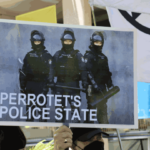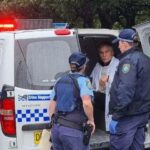Have a Very Perrottet Christmas, Let’s Make Sure It’s Our Last

As a Christian fundamentalist and ultraconservative neocon, NSW premier Dominic Perrottet has done a fine job of maintaining an outward appearance in the public sphere that conveys a regular Aussie guy, whilst he holds viewpoints and social values that border on the extreme.
Perrottet took on the top job in October last year, as a disgraced Gladys Berejikilian stepped down over pork barrelling and at a time when the new Liberal leader was able to curry the favour of many amongst a public made weary by a prolonged lockdown via the removal of all COVID restrictions.
And while his support for a cashless gambling card to stamp out money laundering has been broadly welcomed, one of the most concerning developments on the political agenda during his time has been the enactment of an anti-protest regime that undermines the rights of nonviolent activists.
Yet, as the NSW constituency gears up for a March election, it’s not merely Perrottet’s leadership that needs to be scrutinised, as there’s been close to 12 years of Liberal Nationals governance in this state and it’s this entirety that has led to the point where the authoritarian seems reasonable.
A supporter of Trump, Perrottet heralded in the 2016 coming of the divisive US president as a “conservative spring”.
But the premier won’t be surfing that sentiment in at the ballot next year, as the nation is currently riding a progressive wave that first picked up at last May’s federal election.
Authoritarian rule
In a sign of just how far the NSW polity has shifted to the right over the last decade, the Perrottet government in early April jammed through some of the most severe anti-protest laws the nation has ever seen within the space of 48 hours.
NSW Greens MLC Abigail Boyd described what took place as “the most draconian thing” she’d “ever witnessed in NSW parliament”.
The legislation passed established an anti-protest regime that sees those conducting unauthorised peaceful but disruptive protests that block a road, tunnel, bridge or major facility facing up to 2 years imprisonment and/or a fine of $22,000.
But it wasn’t until Violet Coco became the first casualty of these laws in early December that much of the constituency took note of their extreme nature, as the climate defender was sentenced to 15 months inside for blocking one lane of traffic on the Harbour Bridge for 25 minutes last April.
Following Coco’s sentencing, Perrottet, who seemed to be sporting a new pair of contact lenses, told the press that her punishment was “not excessive”, but rather it was “pleasing to see” and if “protesters want to put our way of life at risk, then they should have the book thrown at them”.
And coupled together, Perrottet’s performance and the harsh new laws convey that the Liberal Nationals, with the support of Labor, have advanced a system that protects the profits of the fossil fuel industry against any threat posed by an uptick in climate protest action.
The authoritarian creep
The NSW Coalition government has long been supporting laws that undermine civil society to the benefit of corporate profit. Premier Barry O’Farrell’s rollout of the Sydney lockout laws led to six years of killing off city nightlight, which ultimately benefited property investors in the Cross.
As NSW Greens MLC Sue Higginson pointed out at a Sydney rally last Saturday, the current protest regime is the second iteration of such laws, which were first spruiked by then premier Mike Baird at a 2014 mining industry dinner, when he explained that a crackdown on protesters was imminent.
This led to the Baird government’s notorious inclosed land amendments in March 2016, which saw the creation of the offence of aggravated unlawful entry on inclosed lands, as well as the broadening of police move on powers to include obstructing traffic without prior authorisation.
And on something of a roll, Baird went onto establish the public safety order and serious crime prevention order regimes, which permit the authorities to place restrictions on a variety of aspects of an individual’s life without proof of their having ever committed or even facilitated any crime.
The Coalition has also been in the habit of enacting laws around firearms, drug supply and the use of encrypted messaging devices, which permit those convicted of crimes in the past to be placed on an order that allows police to search them, their premises and vehicles at any time without a warrant.
And somewhat ominously similar such laws are being contemplated in the UK that would allow for the heightened ongoing policing of those previously convicted in relation to climate protests.
Addicted to privatisation
Perrottet also has a habit of selling off public assets to private interests. The premier championed this cause during his time as state treasurer.
Instead of privatisation though, he likes to call it asset recycling, which involves selling publicly owned assets to invest in new infrastructure that’s invariably privately owned.
This predilection for privatisation is part of the premier’s neoliberal convictions that place a value on limited government intervention in the economy and devalue the role of civil society, which has contributed to the energy crisis in this nation that Perrottet is now scrambling to intervene in.
According to Labor candidate for the NSW Legislative Council Stephen Lawrence, the NSW Coalition government has sold off $93 billion worth of public assets since 2011. And its recent privatising of “two of the three energy distributors has led to super profits” and skyrocketing bills for constituents.
“We have committed to a ban on further privatisation,” the NSW barrister told Sydney Criminal Lawyers this month, in relation to how a new Labor government would transform the state if elected into office next year.
“So, they’re privatisation mad. And that will end,” Lawrence added. “We have already committed to a very significant boost to paramedic numbers. We have already committed to a huge boost in permanent teacher numbers.”
The rise of progressives
But it’s not just Labor Perrottet has to fear at the ballot next March. This year has been marked by what have been referred to as the greenslides, which have consisted of a turning away from both majors at the May federal election and at the vote for a state government in Victoria last month.
The federal vote resulted in 12 Greens Senators and 4 MPs, along with 10 teal independents being elected into the lower house. While the Victorian election saw 4 Greens MPs elected into the lower house and another 4 in the upper house, along with the election of 2 Legalise Cannabis MLCs.
These results reveal that, as the acknowledgment of the need to act on the climate crisis is rising at the grassroots level, both majors refusing to take adequate action on climate and instead progressing the tough law and order agenda is no longer going to cut it.
“There are 98 days until the next state election,” Higginson told the group of protesters gathered out the front of Sydney Town Hall last Saturday.
“Let’s get more people into parliament, so we can repeal these absurd anti-protest laws and we can get action on climate change.”







